Charles E W Bean, Diaries, AWM38 3DRL 606/116/1 - June - September 1918 - Part 4
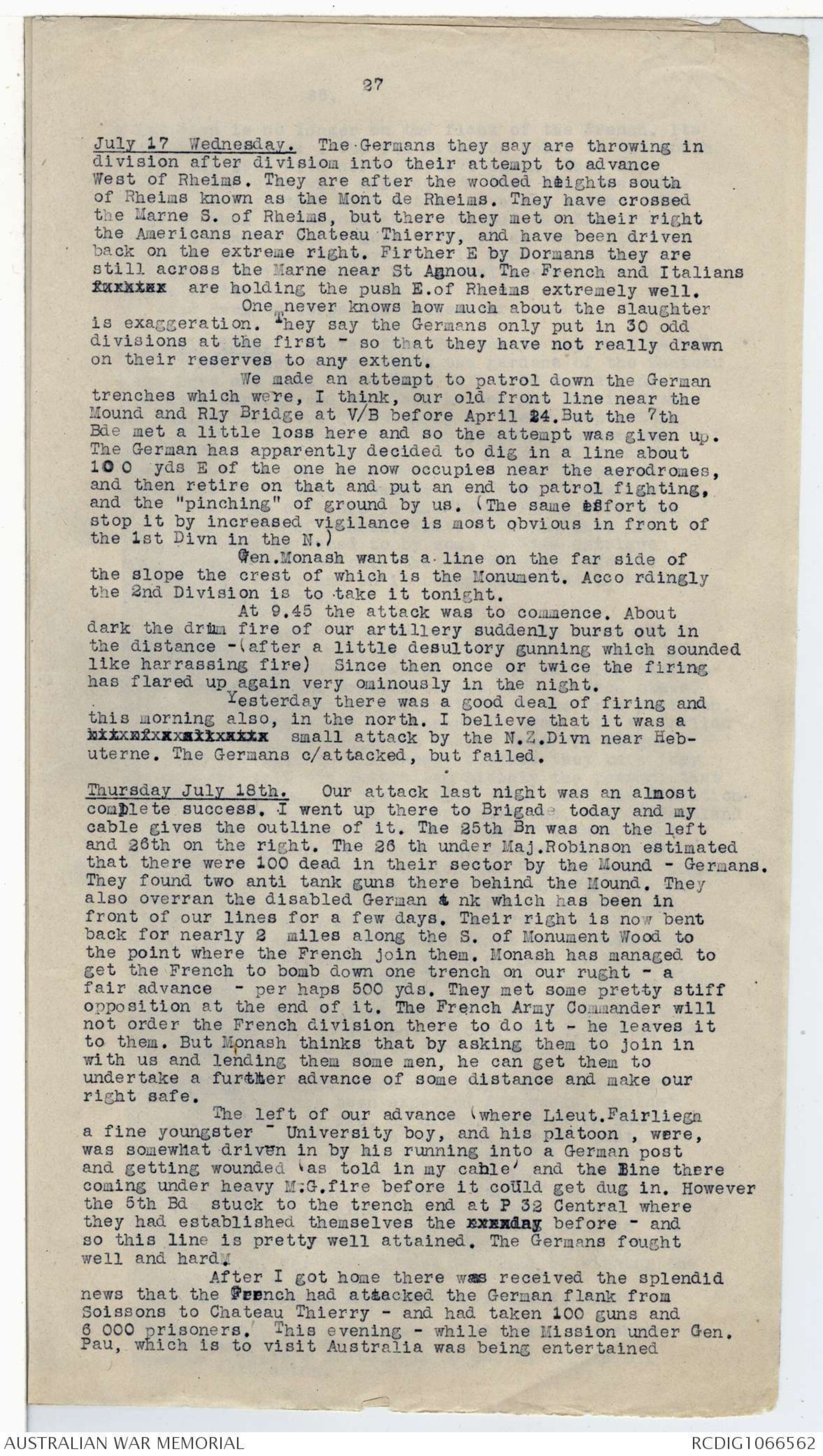
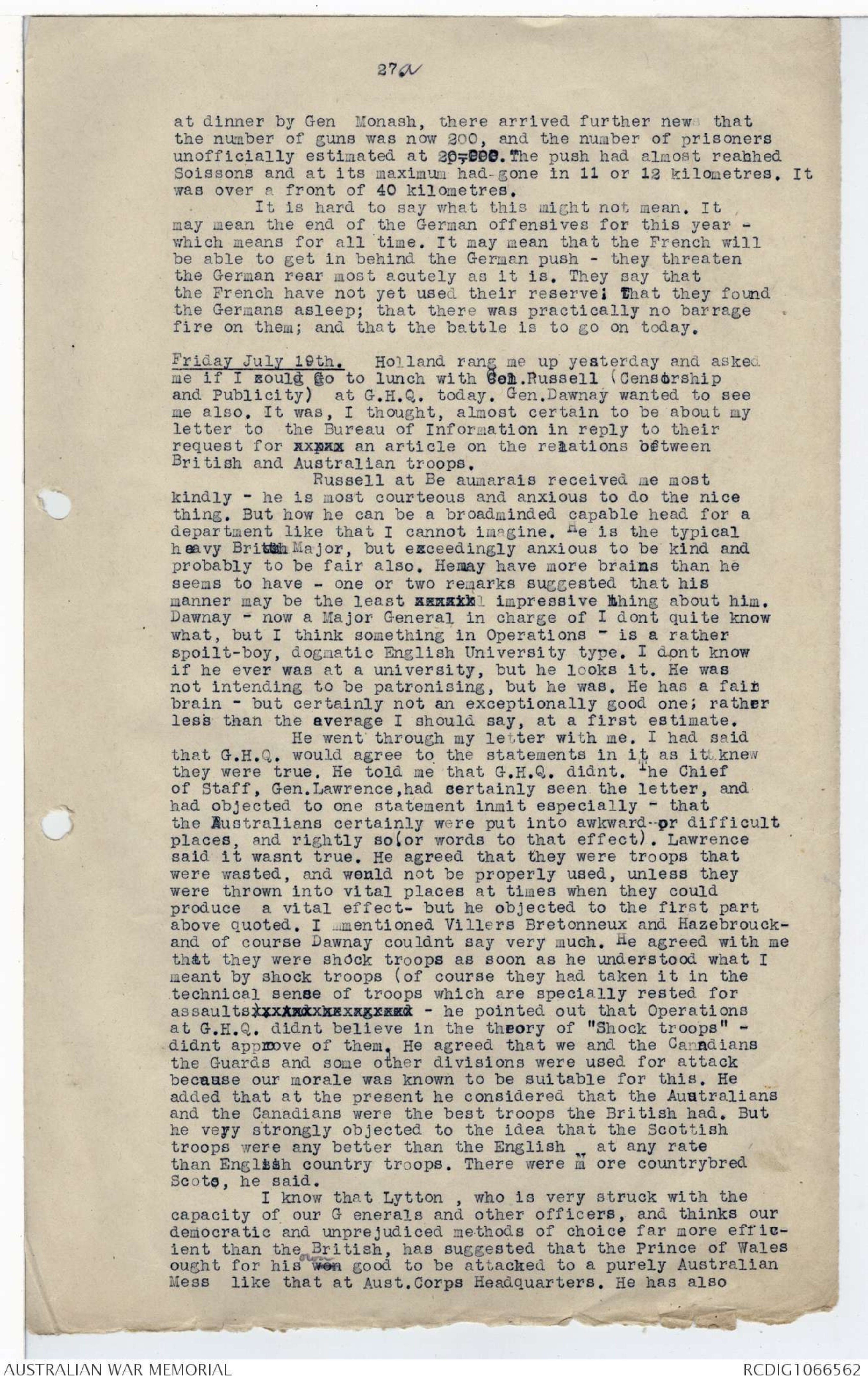
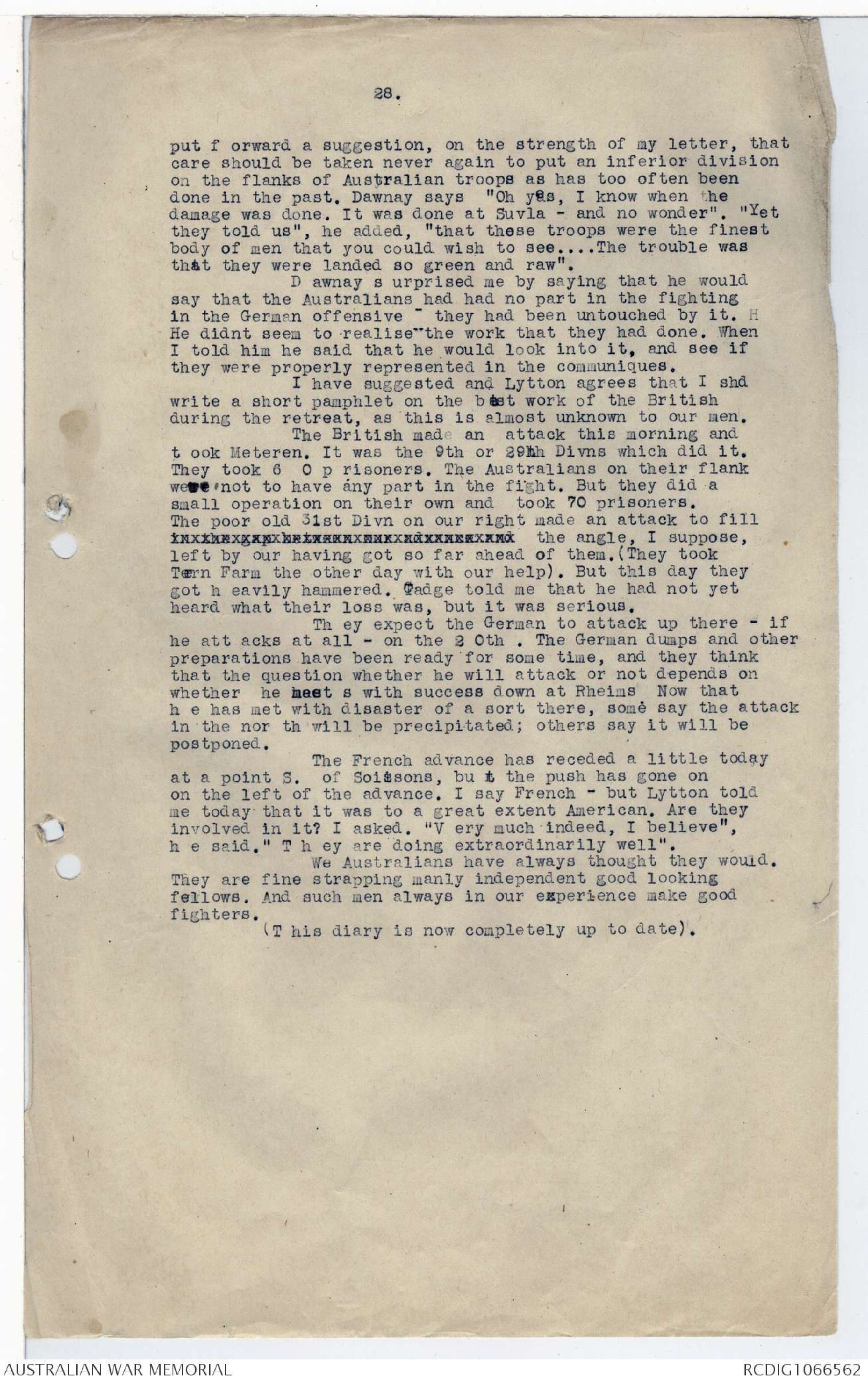
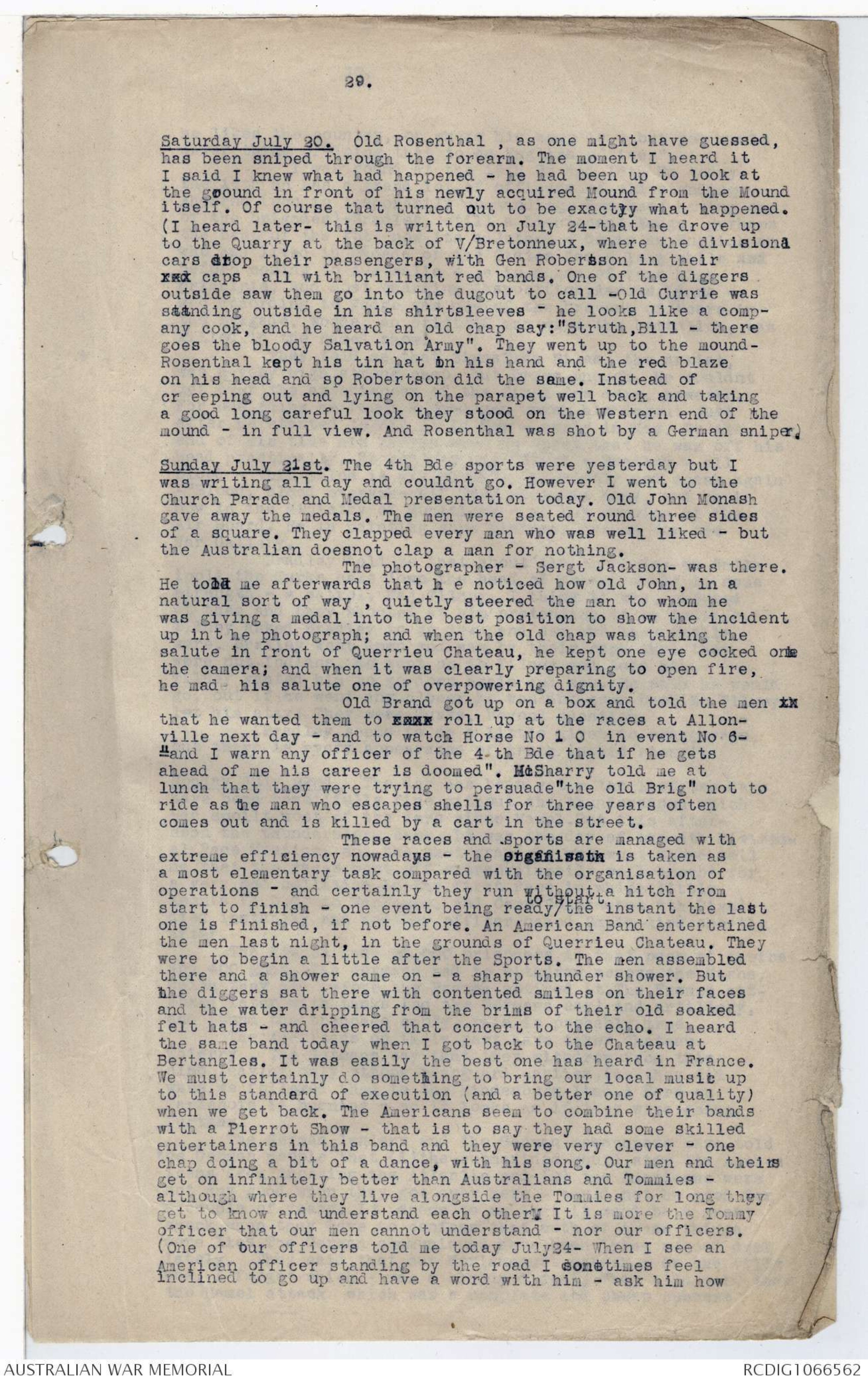
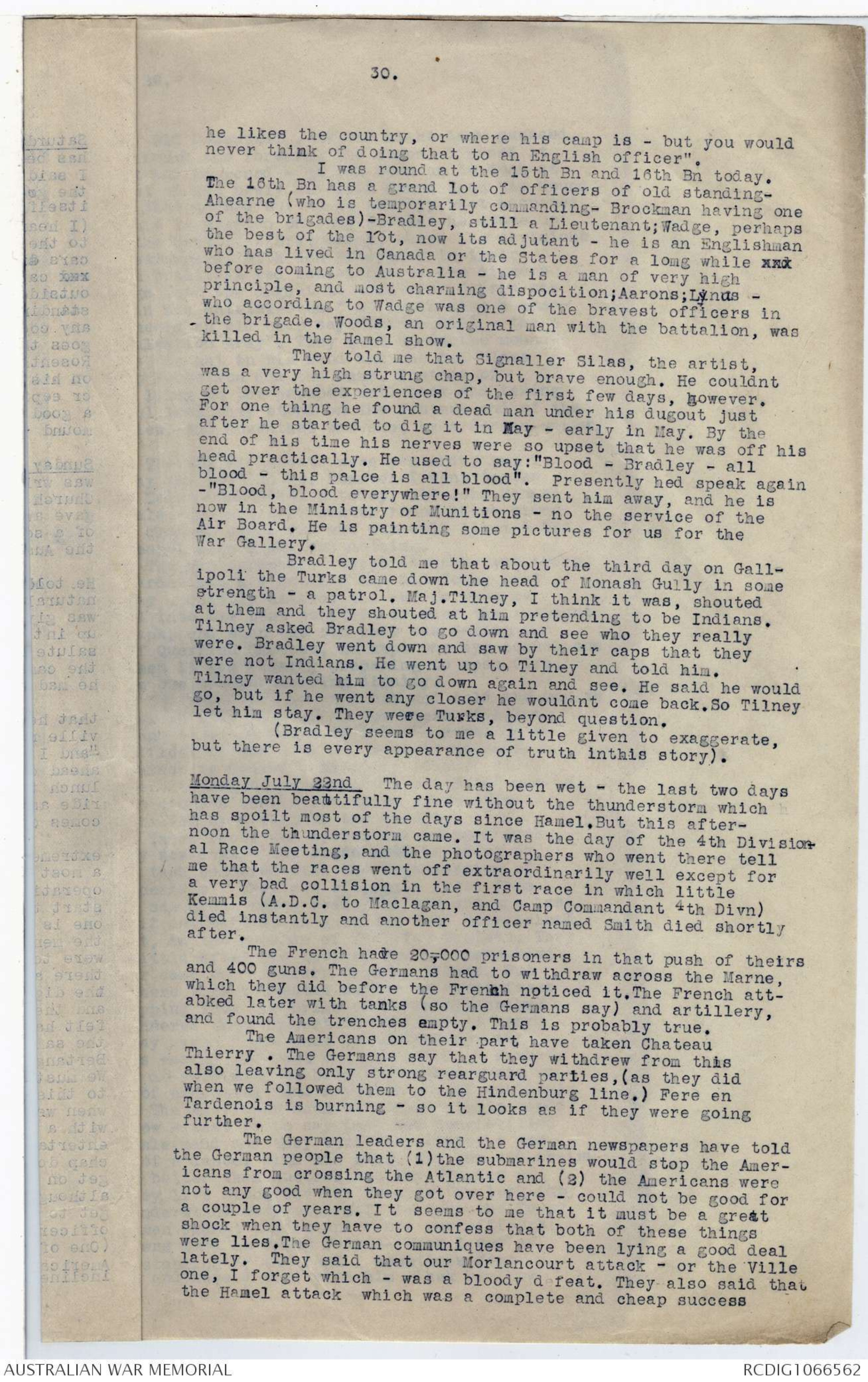
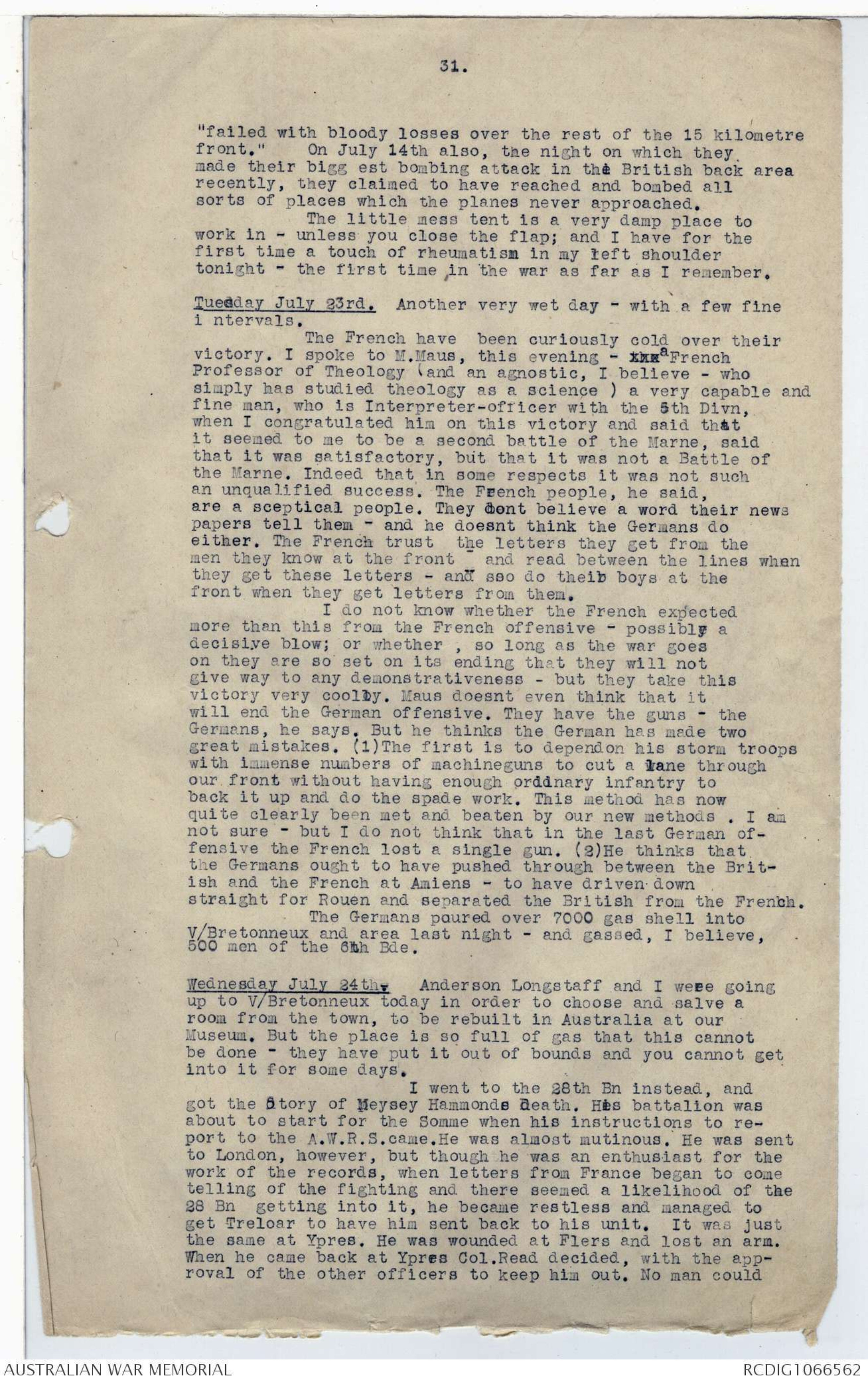
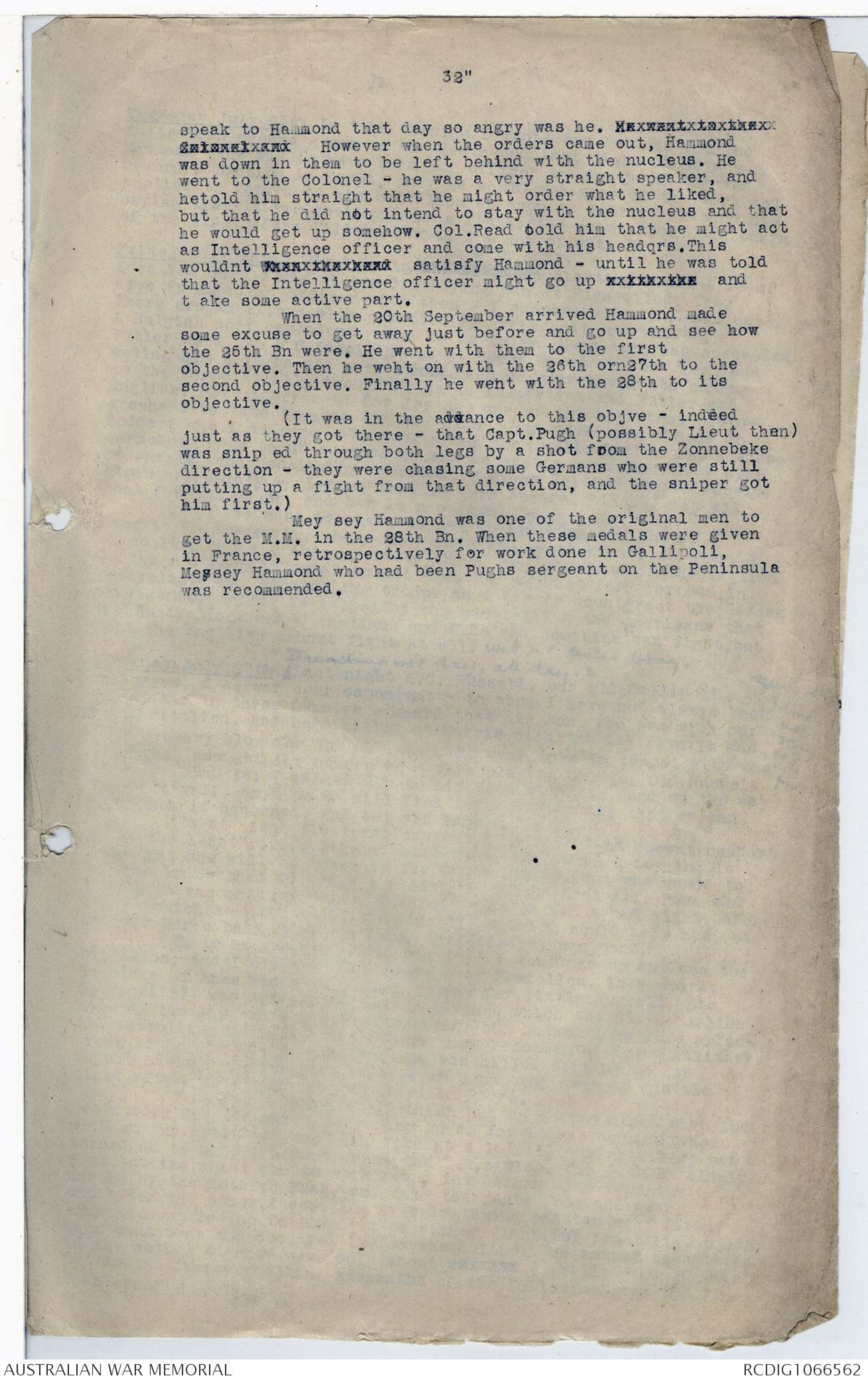
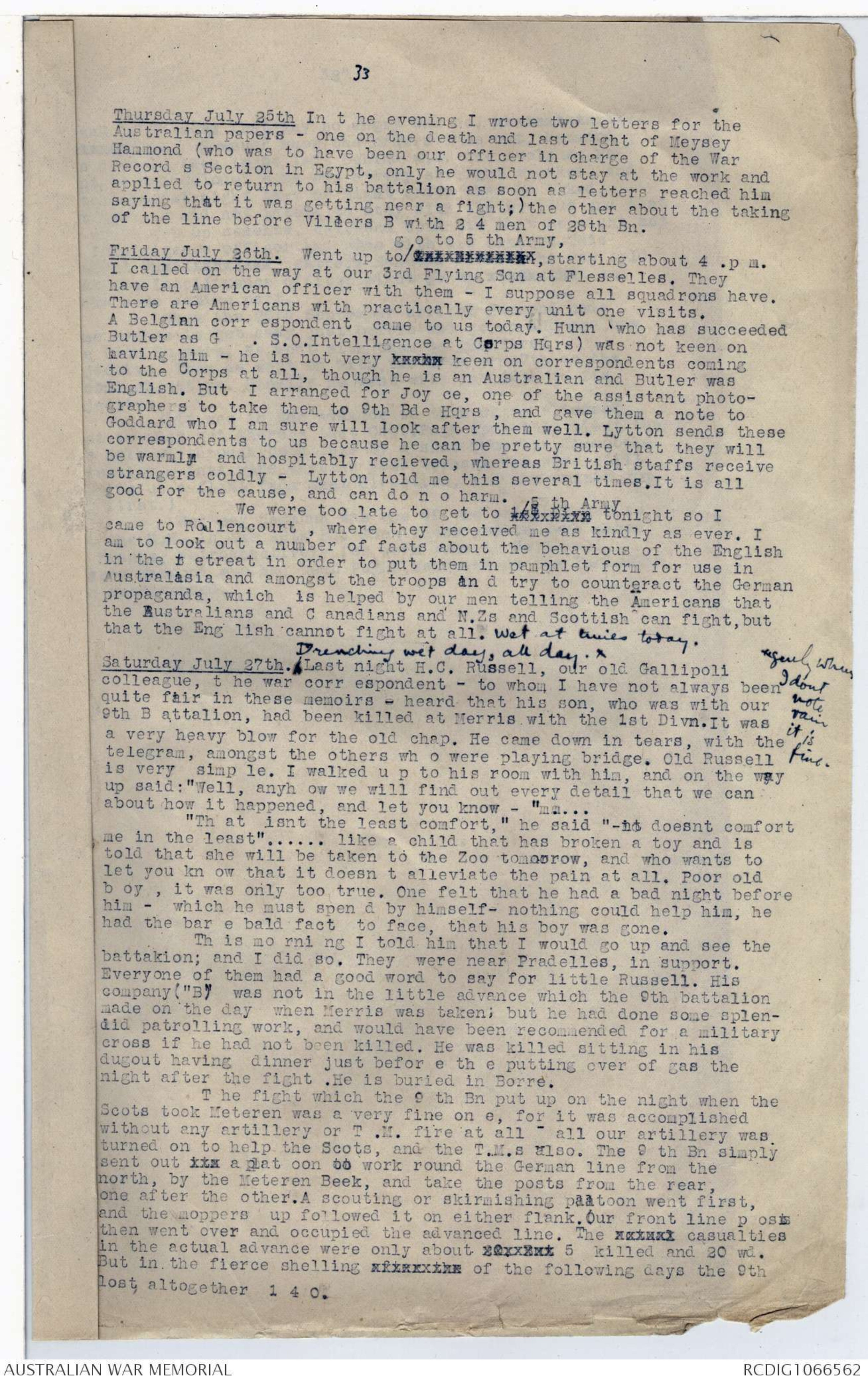
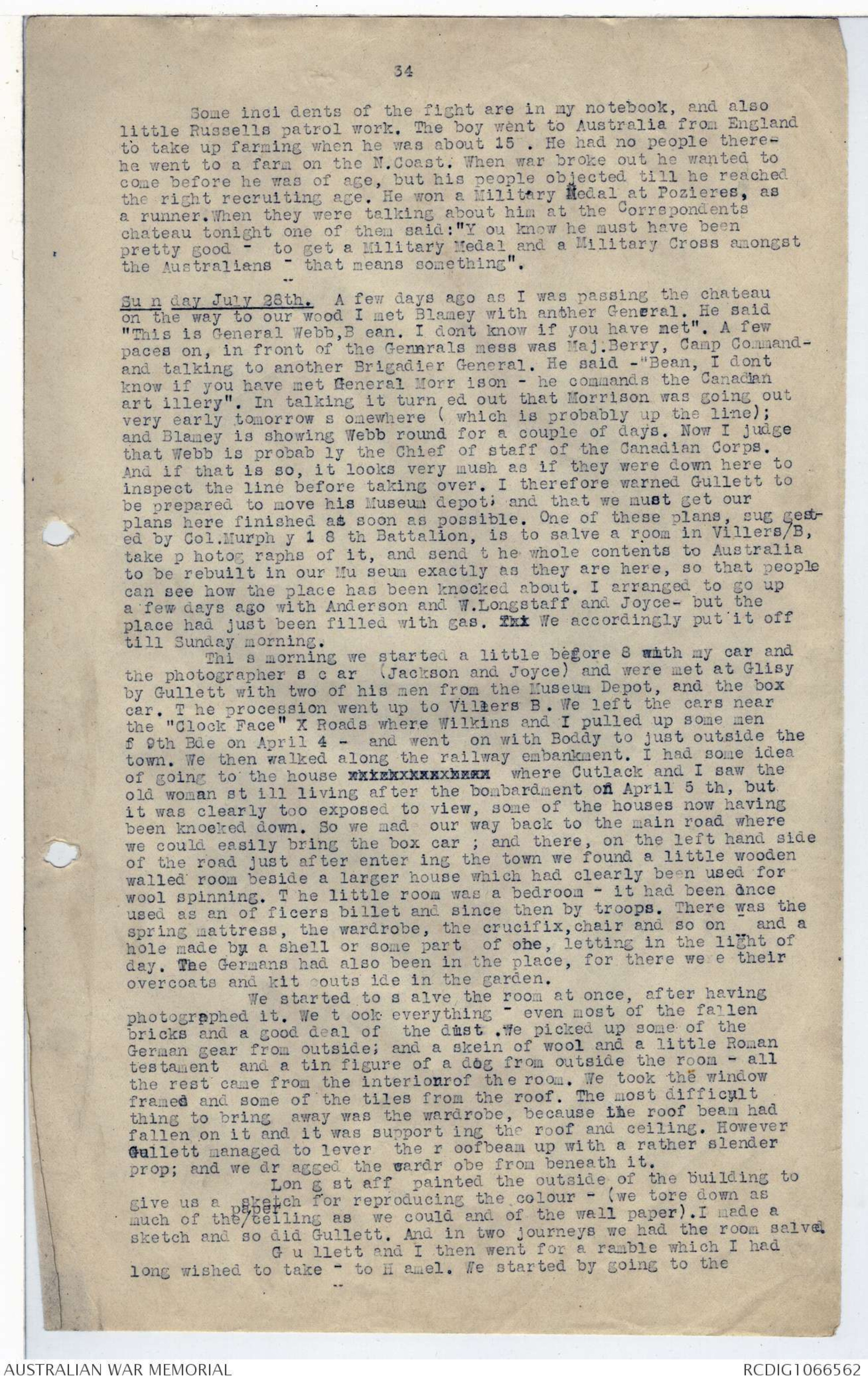
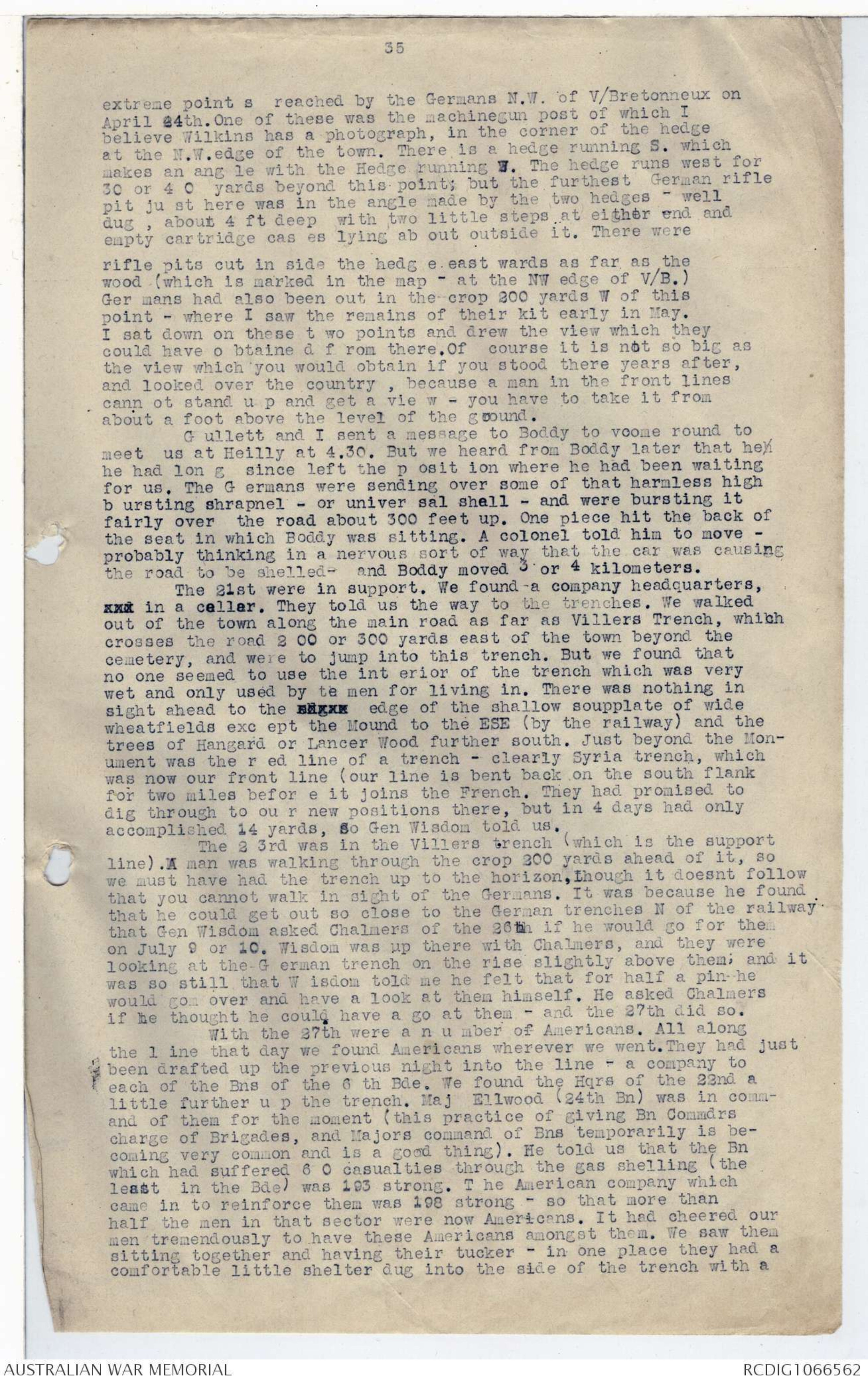
27
July 17 Wednesday. The Germans they say are throwing in
division after divisiom into their attempt to advance
West of Rheims. They are after the wooded hieights south
of Rheims known as the Mont de Rheims. They have crossed
the Marne S. of Rheims, but there they met on their right
the Americans near Chateau Thierry, and have been driven
back on the extreme right. Firther E by Dormans they are
still across the Marne near St Agnou. The French and Italians
xxxxxxxx are holding the push E.of Rheeims extremely well.
One never knows how much about the slaughter
is exaggeration. They say the Germans only put in 30 odd
divisions at the first - so that they have not really drawn
on their reserves to any extent.
We made an attempt to patrol down the German
trenches which were, I think, our old front line near the
Mound and Rly Bridge at V/B before April 24.But the 7th
Bde met a little loss here and so the attempt was given up.
The German has apparently decided to dig in a line about
100 yds E of the one he now occupies near the aerodromes,
and then retire on that and put an end to patrol fighting,
and the "pinching" of ground by us. (The same iseffort to
stop it by increased vigilance is most obvious in front of
the 1st Divn in the N.)
Gen.Monash wants a line on the far side of
the slope the crest of which is the Monument. Acco rdingly
the 2nd Division is to take it tonight.
At 9.45 the attack was to commence. About
dark the drium fire of our artillery suddenly burst out in
the distance -(after a little desultory gunning which sounded
like harrassing fire) Since then once or twice the firing
has flared up again very ominously in the night.
Yesterday there was a good deal of firing and
this morning also, in the north. I believe that it was a
small attack by the N.Z.Divn near Hebuterne.
The Germans c/attacked, but failed.
Thursday July 18th. Our attack last night was an almost
complete success. I went up there to Brigade today and my
cable gives the outline of it. The 25th Bn was on the left
and 26th on the right. The 26 th under Maj.Robinson estimated
that there were 100 dead in their sector by the Mound - Germans.
They found two anti tank guns there behind the Mound. They
also overran the disabled German t nk which has been in
front of our lines for a few days. Their right is now bent
back for nearly 2 miles along the S. of Monument Wood to
the point where the French join them. Monash has managed to
get the French to bomb down one trench on our rught - a
fair advance - per haps 500 yds. They met some pretty stiff
opposition at the end of it. The French Army Commander will
not order the French division there to do it - he leaves it
to them. But Monash thinks that by asking them to join in
with us and lending them some men, he can get them to
undertake a further advance of some distance and make our
right safe.
The left of our advance (where Lieut. Fairliegn
a fine youngster - University boy, and his platoon, were,
was somewhat driven in by his running into a German post
and getting wounded 'as told in my cable' and the Bine there
coming under heavy M:G. fire before it coüld get dug in. However
the 5th Bd stuck to the trench end at P 32 Central where
they had established themselves the exday before - and
so this line is pretty well attained. The Germans fought
well and hard"
After I got home there was received the splendid
news that the French had attacked the German flank from
Soissons to Chateau Thierry - and had taken 100 guns and
6 000 prisoners.
This evening - while the Mission under Gen.
Pau, which is to visit Australia was being entertained
27.a
at dinner by Gen Monash, there arrived further news that
the number of guns was now 200, and the number of prisoners
unofficially estimated at 20290. The push had almost reahhed
Soissons and at its maximum had-gone in 11 or 12 kilometres. It
was over a front of 40 kilometres
It is hard to say what this might not mean. It
may mean the end of the German offensives for this year -
which means for all time. It may mean that the French will
be able to get in behind the German push - they threaten
the German rear most acutely as it is. They say that
the French have not yet used their reserve! That they found
the Germans asleep; that there was practically no barrage
fire on them; and that the battle is to go on today.
Friday July 19th. Holland rang me up yesterday and asked
me if I could go to lunch with Gen. Russell (Censorship
and Publicity) at G.H.Q. today. Gen.Dawnay wanted to see
me also. It was, I thought, almost certain to be about my
letter to the Bureau of Information in reply to their
request for xxxx an article on the relations between
British and Australian troops.
Russell at Be aumarais received me most
kindly - he is most courteous and anxious to do the nice
thing. But how he can be a broadminded capable head for a
department like that I cannot imagine. He is the typical
heavy British Major, but exceedingly anxious to be kind and
probably to be fair also, Hemay have more brains than he
seems to have - one or two remarks suggested that his
manner may be the least impressive thing about him.
Dawnay - now a Major General in charge of I dont quite know
what, but I think something in Operations - is a rather
spoilt-boy, dogmatic English University type. I dont know
if he ever was at a university, but he looks it. He was
not intending to be patronising, but he was. He has a fair
brain - but certainly not an exceptionally good one; rather
less than the average I should say, at a first estimate.
He went through my letter with me. I had said
that G.H.Q. would agree to the statements in it as it knew
they were true. He told me that G.H.Q. didnt. The Chief
of Staff, Gen.Lawrence, had certainly seen the letter, and
had objected to one statement inmit especially - that
the Australians certainly were put into awkward-or difficult
places, and rightly so(or words to that effect). Lawrence
said it wasnt true. He agreed that they were troops that
were wasted, and would not be properly used, unless they
were thrown into vital places at times when they could
produce, a vital effect- but he objected to the first part
above quoted. I mentioned Villers Bretonneux and Hazebrouck-
and of course Dawnay couldnt say very much. He agreed with me
thit they were shock troops as soon as he understood what I
meant by shock troops (of course they had taken it in the
technical sense of troops which are specially rested for
assaults xxxxxxxxxxxxxxx - he pointed out that Operations
at G.H.Q. didnt believe in the theory of "Shock troops" -
didnt approve of them, He agreed that we and the Canndians
the Guards and some other divisions were used for attack
because our morale was known to be suitable for this. He
added that at the present he considered that the Auntralians
and the Canadians were the best troops the British had. But
he very strongly objected to the idea that the Scottish
troops were any better than the English .. at any rate
than English country troops. There were m ore countrybred
Scots, he said.
I know that Lytton, who is very struck with the
capacity of our G enerals and other officers, and thinks our
democratic and unprejudiced methods of choice far more efficient
than the British, has suggested that the Prince of Wales
ought for his won own good to be attached to a purely Australian
Mess like that at Aust.Corps Headquarters. He has also
28.
put f orward a suggestion, on the strength of my letter, that
care should be taken never again to put an inferior division
on the flanks of Australian troops as has too often been
done in the past. Dawnay says, "Oh yas, I know when the
damage was done. It was done at Suvla - and no wonder". "Yet
they told us", he added, "that those troops were the finest
body of men that you could wish to see.... The trouble was
that they were landed so green and raw'
D awnay surprised me by saying that he would
say that the Australians had had no part in the fighting
in the German offensive, they had been untouched by it. H
He didnt seem to realise"the work that they had done. When
I told him he said that he would look into it, and see if
they were properly represented in the communiques.
I have suggested and Lytton agrees that I shd
write a short pamphlet on the best work of the British
during the retreat, as this is almost unknown to our men.
The British made an attack this morning and
t ook Meteren. It was the 9th or 29h Divns which did it.
They took 6 0 p risoners. The Australians on their flank
were not to have any part in the fight. But they did a
small operation on their own and took 70 prisoners.
The poor old 31st Divn on our right made an attack to fillxxxxxxxxxxxxxxxxxxxxxxxxxxxxx the angle, I suppose,
left by our having got so far ahead of them. (They took
Tern Farm the other day with our help). But this day they
got h eavily hammered. Cadge told me that he had not yet
heard what their loss was, but it was serious.
They expect the German to attack up there - if
he att acks at all - on the 2 0th. The German dumps and other
preparations have been ready for some time, and they think
that the question whether he will attack or not depends on
whether he meets with success down at Rheims Now that
he has met with disaster of a sort there, somé say the attack
in the nor th will be precipitated; others say it will be
postponed.
The French advance has receded a little today
at a point S. of Soissons, bu t the push has gone on
on the left of the advance. I say French - but Lytton told
me today that it was to a great extent American. Are they
involved in it? I asked. "V ery much indeed, I believe'
" T h ey are doing extraordinarily well
he said.
We Australians have always thought they would.
They are fine strapping manly independent good looking
fellows. And such men always in our experience make good
fighters.
(T his diary is now completely up to date).
29.
Saturday July 20. Old Rosenthal, as one might have guessed,
has been sniped through the forearm. The moment I heard it
I said I knew what had happened - he had been up to look at
the goound in front of his newly acquired Mound from the Mound
itself. Of course that turned out to be exactly what happened.
(I heard later- this is written on July 24-that he drove up
to the Quarry at the back of V/Bretonneux, where the divisiond
cars stop their passengers, with Gen Robersson in their
caps, all with brilliant red bands. One of the diggers
outside saw them go into the dugout to call -Old Currie was
stinding outside in his shirtsleeves - he looks like a company
cook, and he heard an old chap say:"Struth, Bill - there
goes the bloody Salvation Army". They went up to the mound-
Rosenthal kept his tin hat on his hand and the red blaze
on his head and sp Robertson did the same. Instead of
cr eeping out and lying on the parapet well back and taking
a good long careful look they stood on the Western end of the
mound - in full view. And Rosenthal was shot by a German sniper)
Sunday July 21st. The 4th Bde sports were yesterday but I
was writing all day and couldnt go. However I went to the
Church Parade and Medal presentation today. Old John Monash
gave away the medals. The men were seated round three sides
of a square. They clapped every man who was well liked - but
the Australian doesnot clap a man for nothing.
The photographer - Sergt Jackson- was there.
He tol me afterwards that h e noticed how old John, in a
natural sort of way, quietly steered the man to whom he
was giving a medal into the best position to show the incident
up int he photograph; and when the old chap was taking the
salute in front of Querrieu Chateau, he kept one eye cocked onte
the camera; and when it was clearly preparing to open fire,
he mad his salute one of overpowering dignity.
Old Brand got up on a box and told the men
that he wanted them to roll up at the races at Allonville
next day - and to watch Horse No i O in event No 6-
Hand I warn any officer of the 4.th Bde that if he gets
ahead of me his career is doomed". Hesharry told me at
lunch that they were trying to persuade"the old Brig" not to
ride as the man who escapes shells for three years often
comes out and is killed by a cart in the street.
These races and sports are managed with
extreme efficiency nowadays - the orgadisath is taken as
a most elementary task compared with the organisation of
operations - and certainly they run with¬
tta hitch from
start to finish - one event being ready/the instant the last
one is finished, if not before. An American Band entertained
the men last night, in the grounds of Querrieu Chateau. The
were to begin a little after the Sports. The men assembled
there and a shower came on - a sharp thunder shower. But
hhe diggers sat there with contented smiles on their faces
and the water dripping from the brims of their old soaked
felt hats - and cheered that concert to the echo. I heard
the same band today, when I got back to the Chateau at
Bertangles. It was easily the best one has heard in France.
We must certainly do something to bring our local musit up
to this standard of execution (and a better one of quality)
when we get back. The Americans seem to combine their bands
with a Pierrot Show - that is to say they had some skilled
entertainers in this band and they were very clever - one
chap doing a bit of a dance, with his song. Our men and theirs
get on infinitely better than Australians and Tommies -
although where they live alongside the Tommies for long they
get to know and understand each other It is more the fommy
officer that our men cannot understand - nor our officers.
(One of our officers told me today July24- When I see an
American officer standing by the road I sonetimes feel
inclined to go up and have a word with him - ask him how
30.
he likes the country, or where his camp is - but you would
never think of doing that to an English officer"
I was round at the 15th Bn and 16th Bn today.
The 16th Bn has a grand lot of officers of old standing-
Ahearne (who is temporarily commanding- Brockman having one
of the brigades)-Bradley, still a Lieutenant; Wadge, perhaps
the best of the lot, now its adjutant - he is an Englishman
who has lived in Canada or the States for a lomg while xxx
before coming to Australia - he is a man of very high
principle, and most charming dispocition;Aarons; Lynds -
who according to Wadge was one of the bravest officers in
the brigade. Woods, an original man with the battalion, was
killed in the Hamel show.
They told me that Signaller Silas, the artist,
was a very high strung chap, but brave enough. He couldnt
get over the experiences of the first few days, however.
For one thing he found a dead man under his dugout just
after he started to dig it in May - early in May. By the
end of his time his nerves were so upset that he was off his
head practically. He used to say: "Blood - Bradley - all
blood - this palce is all blood". Presently hed speak again
-"Blood, blood everywhere!" They sent him away, and he is
now in the Ministry of Munitions - no the service of the
Air Board. He is painting some pictures for us for the
War Gallery.
Bradley told me that about the third day on Gallipoli
the Turks came down the head of Monash Gully in some
strength - a patrol. Maj.Tilney, I think it was, shouted
at them and they shouted at him pretending to be Indians.
Tilney asked Bradley to go down and see who they really
were. Bradley went down and saw by their caps that they
were not Indians. He went up to Tilney and told him.
Tilney wanted him to go down again and see. He said he would
go, but if he went any closer he wouldnt come back. So Tilney
let him stay. They were Turks, beyond question.
(Bradley seems to me a little given to exaggerate,
but there is every appearance of truth inthis story).
Monday July 22nd The day has been wet - the last two days
have been beattifully fine without the thunderstorm which
has spoilt most of the days since Hamel.But this afternoon
the thunderstorm came. It was the day of the 4th Divisional
Race Meeting, and the photographers who went there tell
me that the races went off extraordinarily well except for
a very bad collision in the first race in which little
Kemmis (A.D.C. to Maclagan, and Camp Commandant 4th Divn)
died instantly and another officer named Smith died shortly
after.
The French hadve 20,000 prisoners in that push of theirs
and 400 guns. The Germans had to withdraw across the Marne
which they did before the French noticed it. The French attabked
later with tanks (so the Germans say) and artillery,
and found the trenches empty. This is probably true.
The Americans on their part have taken Chateau
Thierry. The Germans say that they withdrew from this
also leaving only strong rearguard parties, (as they did
when we followed them to the Hindenburg line.) Fere en
Tardenois is burning - so it looks as if they were going
further.
The German leaders and the German newspapers have told
the German people that (i)the submarines would stop the Americans
from crossing the Atlantic and (2) the Americans were
not any good when they got over here - could not be good for
a couple of years. It seems to me that it must be a great
shock when they have to confess that both of these things
were lies. The German communiques have been lying a good deal
lately. They said that our Morlancourt attack - or the Ville
one, I forget which - was a bloody dfeat. They also said that
the Hamel attack, which was a complete and cheap success
31.
"failed with bloody losses over the rest of the 15 kilometre
front.
On July 14th also, the night on which they
made their bigg est bombing attack in the British back area
recently, they claimed to have reached and bombed all
sorts of places which the planes never approached.
The little mess tent is a very damp place to
work in - unless you close the flap; and I have for the
first time a touch of rheumatism in my left shoulder
tonight
the first time in the war as far as I remember.
Tuesday July 23rd. Another very wet day - with a few fine
i ntervals
The French have been curiously cold over their
victory. I spoke to M.Maus, this evening - French
Professor of Theology (and an agnostic, I believe - who
simply has studied theology as a science) a very capable and
fine man, who is Interpreter-officer with the 5th Divn,
when I congratulated him on this victory and said that
it seemed to me to be a second battle of the Marne, said
that it was satisfactory, but that it was not a Battle of
the Marne. Indeed that in some respects it was not such
an unqualified success. The Fsench people, he said
are a sceptical people. They dont believe a word their news
papers tell them - and he doesnt think the Germans do
either. The French trust the letters they get from the
men they know at the front,, and read between the lines when
they get these letters - and sso do theib boys at the
front when they get letters from them.
I do not know whether the French expected
more than this from the French offensive - possibly a
decisive blow; or whether, so long as the war goes
on they are so set on its ending that they will not
give way to any demonstrativeness - but they take this
victory very coolly. Maus doesnt even think that it
will end the German offensive. They have the guns - the
Germans, he says. But he thinks the German has made two
great mistakes. (i) The first is to dependon his storm troops
with immense numbers of machineguns to cut a lane through
our front without having enough orddnary infantry to
back it up and do the spade work. This method has now
quite clearly been met and beaten by our new methods . I am
not sure - but I do not think that in the last German offensive
the French lost a single gun. (2)He thinks that
the Germans ought to have pushed through between the British
and the French at Amiens - to have driven down
straight for Rouen and separated the British from the French.
The Germans poured over 7000 gas shell into
V/ Bretonneux and area last night - and gassed, I believe,
500 men of the Oth Bde.
Wednesday July 24th. Anderson Longstaff and I were going
up to V/Bretonneux today in order to choose and salve a
room from the town, to be rebuilt in Australia at our
Museum. But the place is so full of gas that this cannot
be done - they have put it out of bounds and you cannot get
into it for some days
I went to the 28th Bn instead, and
got the Story of Heysey Hammonds heath. Hes battalion was
about to start for the Somme when his instructions to report
to the A.W.R.S.came.He was almost mutinous. He was sent
to London, however, but though he was an enthusiast for the
work of the records, when letters from France began to come
telling of the fighting and there seemed a likelihood of the
28 Bn getting into it, he became restless and managed to
get Treloar to have him sent back to his unit. It was just
the same at Ypres. He was wounded at Flers and lost an arm.
When he came back at Ypres Col.Read decided, with the approval
of the other officers to keep him out. No man could
32"
speak to Hammond that day so angry was he. Mxxxxk
However when the orders came out, Hammond
was down in them to be left behind with the nucleus. He
went to the Colonel - he was a very straight speaker, and
hetold him straight that he might order what he liked
but that he did not intend to stay with the nucleus and that
he would get up somehow. Col.Read oold him that he might act
as Intelligence officer and come with his headors. This
wouldnt satisfy Hammond - until he was told
that the Intelligence officer might go up and
t ake some active part.
When the 20th September arrived Hammond made
some excuse to get away just before and go up and see how
the 25th Bn were. He went with them to the first
objective. Then he weht on with the 26th orn27th to the
second objective. Finally he went with the 28th to its
objective.
(It was in the adance to this objve - indeed
just as they got there - that Capt.Pugh (possibly Lieut then)
was snip ed through both legs by a shot foom the Zonnebeke
direction - they were chasing some Germans who were still
putting up a fight from that direction, and the sniper got
him first.)
Mey sey Hammond was one of the original men to
get the M.M. in the 28th Bn. When these medals were given
in France, retrospectively for work done in Gallipoli
Messey Hammond who had been Pughs sergeant on the Peninsula
was recommended.
33
Thursday July 25th In t he evening I wrote two letters for the
Australian papers - one on the death and last fight of Meysey
Hammond (who was to have been our officer in charge of the War
Records Section in Egypt, only he would not stay at the work and
applied to return to his battalion as soon as letters reached him
saying thit it was getting near a fight;) the other about the taking
of the line before Vileers B with 2 4 men of 28th Bn.
Friday July 26th. Went up to/XXXXX, starting about 4 .p m.
I called on the way at our 3rd Flying San at Flesselles. They
have an American officer with them - I suppose all squadrons have.
There are Americans with practically every,unit one visits.
A Belginn corr espondent, came to us today. Hunn 'who has succeeded
Butler as G. S.O. Intelligence at Corps Hors) was not keen on
having him - he is not very kkeen on correspondents coming
to the Corps at all, though he is an Australian and Butler was
English. But I arranged for Joy ce, one of the assistant photographers
to take them to 9th Bde Hors, and gave them a note to
Goddard who I am sure will look after them well. Lytton sends these
correspondents to us because he can be pretty sure that they will
be warmly and hospitably recieved, whereas British staffs receive
strangers coldly - Lytton told me this several times. It is all
good for the cause, and can do n o harm.
in Arnicht so
We were too late to get to ate
came to Rollencourt, where they received me as kindly as ever.
am to look out a number of facts about the behavious of the English
in'the t etreat in order to put them in pamphlet form for use in
Australasia and amongst the troops an d try to counteract the German
propaganda, which is helped by our men telling the Americans that
the Bustralians and C anadians and N.Zs and Scottish can fight,but
that the Eng lish cannot fight at all. wet at auie toen
Trenchang wet dass, at deni
Gutf ee
Saturday July 27th./Last night H.C. Rüssell, our old Gallipoli
colleague, t he war corr espondent - to whom I have not always bee
Sat
quite fair in these memoirs - heard that his son, who was with our
ho
9th B attalion, had been killed at Herris with the ist Divn.It was
a very heavy blow for the old chap. He came down in tears, with the
telegram, amongst the others wh o were playing bridge. Old Russell
Sing.
is very, simp le. I walked up to his room with him, and on the way
up said:"Well, anyh ow we will find out every detail that we can
about how it happened, and let you know - "ma...
"Th at isnt the least comfort
" he said "-nt doesnt comfort
me in the least"...... like a child that has broken a toy and is
told that she will be taken to the Zoo tomoprow, and who wants to
let you kn ow that it doesn t alleviate the pain at all. Poor old
boy, it was only tooptrue. One felt that he had a bad night before
him - which he must spen d by himself- nothing could help him, he
had the bar e bald fact, to face, that his boy was gone.
Ih is mo rniung I told him that I would go up and see the
battakion; and I did so. They were near Pradelles, in support.
Everyone of them had a good word to say for little Russell. His
company("B) was not in the little advance which the 9th battalion
made on the day, when Merris was taken! but he had done some splendid
patrolling work, and would have been recommended for a military
cross if he had not been killed. He was killed sitting in his
dugout having dinner just befor e the putting over of gas the
night after the fight.He is buried in Borre.
T he fight which the 9 th Bn put up on the night when the
Scots took Meteren was a very fine on e, for it was accomplished
without any artillery or T.M. fire at all all our artillery was
turned on to help the Scots, and the T.M.s also. The 9 th Bn simply
sent out a plat oon oo work round the German line from the
morth, by the Meteren Beek, and take the posts from the rear
one after the other.A scouting or skirmishing paatoon went first,
and the moppers up followed it on either flank.Our front line p ost
then went over and occupied the advanced line. The casualties
in the actual advance were only about 5 killed and 20 wd.
But in the fierce shelling of the following days the Oth
lost altogether i 4 0.
34
Some inci dents of the fight are in my notebook, and also
little Russells patrol work. The boy went to Australia from England
to take up farming when he was about i5. He had no people there-
he went to a farm on the N.Coast. When war broke out he wanted to
come before he was of age, but his people objected till he reached
the right recruiting age. He won a Military Medal at Pozieres, as
a runner. When they were talking about him at the Corrspondents
chateau tonight one of them said:"Y ou know he must have been
pretty good - to get a Military Medal and a Military Cross amongst
the Australians " that means something",
Sun day July 28th. A few days ago as I was passing the chateau
on the way to our wood I met Blamey with anther General. He said
"This is General Webb, B ean. I dont know if you have net". A few
paces on, in front of the Gennrals mess was Maj.Berry, Camp Command-
and talking to another Brigadier General. He said - "Bean, I dont
know if you have met Heneral Morr ison - he commands the Canadhan
. In talking it turn ed out that Morrison was going out
art illery
very early tomorrow s omewhere (which is probably up the line);
and Blamey is showing Webb round for a couple of days. Now I judge
that Webb is probab ly the Chief of staff of the Canadian Corps.
And if that is so, it looks very mush as if they were down here to
inspect the line before taking over. I therefore warned Gullett to
be prepared to move his Museum depot: and that we must get our
plans here finished as soon as possible. One of these plans, sug gest
ed by Col.Murph y i 8 th Battalion, is to salve a room in Villers/B,
take p hotog raphs of it, and send t he whole contents to Australia
to be rebuilt in our Mu seum exactly as they are here, so that people
can see how the place has been knocked about. I arranged to go up
a few days ago with Anderson and W.Longstaff and Joyce- but the
place had just been filled with gas. I We accordingly put'it off
till Sunday morning.
This morning we started a little begore 8 th my car and
the photographer s c ar (Jackson and Joyce) and were met at Glisy
by Gullett with two of his men from the Museum Depot, and the box
car. T he procession went up to Viliers B. We left the cars near
the "Clock Face" X Roads where Wilkins and I pulled up some men
f 9th Bde on April 4 - and went on with Boddy to just outside the
town. We then walked along the railway embankment. I had some idea
of going to the house where Cutlack and I saw the
old woman st ill living after the bombardment on April 5 th, but
it was clearly too exposed to view, some of the houses now having
been knoeked down. So we mad our way back to the main road where
we could easily bring the box car ; and there, on the left hand side
of the road just after enter ing the town we found a little wooden
walled room beside a larger house which had clearly been used for
wool spinning. T he little room was a bedroom - it had been once
used as an of ficers billet and since then by troops. There was the
and a
spring mattress, the wardrobe, the crucifix, chair and so on
hole made by a shell or some part, of ohe, letting in the light of
day. The Germans had also been in the place, for there wese their
overcoats and kit couts ide in the garden.
We started to s alve the room at once, after having
even most of the fallen
photographed it. We t ook everything
bricks and a good deal of the dust .We picked up some of the
German gear from outside; and a skein of wool and a little Roman
testament, and a tin figure of a dog from outside the room - all
the rest came from the interionrof the room. We took the window
framed and some of the tiles from the roof. The most difficult
thing to bring away was the wardrobe, because the roof beam had
fallen on it and it was support ing the roof and ceiling. However
Gullett managed to lever, the r oofbeam up with a rather slender
prop; and we dr agged the wardr obe from beneath it
Lon g st aff painted the outside of the building to
ich for reproducing the colour - (we tore down as
give us a på58
much of the celing as we could and of the wall paper). I made a
sketch and so did Gullett. And in two journeys we had the room salve.
Gu llett and I then went for a ramble which I had
long wished to take - to H amel. We started by going to the
35
extreme point s reached by the Germans N.W. of V/Bretonneux on
April 24th.One of these was the machinegun post of which I
believe Wilkins has a photograph, in the corner of the hedge
at the N.W.edge of the town. There is a hedge running S. which
makes an ang le with the Hedge running W. The hedge runs west for
30 or 4 0 yards beyond this point; but the furthest German rifle
pit ju st here was in the angle made by the two hedges - well
dug, about 4 ft deep, with two little steps at either end and
empty cartridge cas es lying ab out outside it. There were
rifle pits cut in side the hedg e east wards as far as the
wood (which is marked in the map - at the NW edge of V/B.)
Ger mans had also been out in the crop 200 yards W of this
point - where I saw the remains of their kit early in May.
I sat down on these t wo points and drew the view which they
could have o btaine d f rom there. Of course it is not so big as
the view which you would obtain if you stood there years after,
and looked over the country, because a man in the front lines
cann ot stand u p and get a vie w- you have to take it from
about a foot above the level of the goound.
G ullett and I sent a message to Boddy to vcome round to
meet us at Heilly at 4.30. But we heard from Boddy later that he
he had lon g since left the p osit ion where he had been waiting
for us. The G ermans were sending over some of that harmless high
b ursting shrapnel - or univer sal shell - and were bursting it
fairly over the road about 300 feet up. One piece hit the back of
the seat in which Boddy was sitting. A colonel told him to move -
probably thinking in a nervous sort of way that the car was causing
the road to be shelled- and Boddy moved 3 or 4 kilometers.
The 21st were in support. We found a company headquarters
in a cellar. They told us the way to the trenches. We walked
out of the town along the main road as far as Villers Trench, which
crosses the road 2 00 or 300 yards east of the town beyond the
cemetery, and were to jump into this trench. But we found that
no one seemed to use the int erior of the trench which was very
wet and only used by te men for living in. There was nothing in
sight ahead to the xxxxx edge of the shallow soupplate of wide
wheatfields exc ept the Mound to the ESE (by the railway) and the
trees of Hangard or Lancer Wood further south. Just beyond the Monument
was the r ed line of a trench - clearly Syria trench, which
was now our front line (our line is bent back on the south flank
for two miles befor e it joins the French. They had promised to
dig through to ou r new positions there, but in 4 days had only
accomplished 14 yards. So Gen Wisdom told us.
The 2 3rd was in the Villers trench (which is the support
line). A man was walking through the crop 200 yards ahead of it, so
we must have had the trench up to the horizon, Lhough it doesnt follow
that you cannot walk in sight of the Germans. It was because he found
that he could get out so close to the German trenches N of the railway
that Gen Wisdom asked Chalmers of the 26th if he would go for the
on July 9 or i0. Wisdom was up there with Chalmers, and they were
looking at the G erman trench on the rise slightly above them; and it
was so still that W isdom told me he felt that for half a pin he
would gon over and have a look at them himself. He asked Chalmers
if he thought he could have a go at them - and the 27th did so.
With the 27th were a n u mber of Americans. All along
the l ine that day we found Americans wherever we went. They had just
been drafted up the previous night into the line - a company to
each of the Bns of the 6 th Bde. We found the Hqrs of the 22nd a
little further u p the trench. Maj Ellwood (24th Bn) was in command
of them for the moment (this practice of giving Bn Commdrs
charge of Brigades, and Majors command of Bns temporarily is becoming
very common and is a good thing). He told us that the Bn
which had suffered 6 0 casualties through the gas shelling (the
least in the Bde) was 193 strong. T he American company which
came in to reinforce them was 198 strong - so that more than
half the men in that sector were now Americans. It had cheered our
men tremendously to have these Americans amongst them. We saw them
sitting together and having their tucker - in one place they had a
comfortable little shelter dug into the side of the trench with a
 Georgina
GeorginaThis transcription item is now locked to you for editing. To release the lock either Save your changes or Cancel.
This lock will be automatically released after 60 minutes of inactivity.